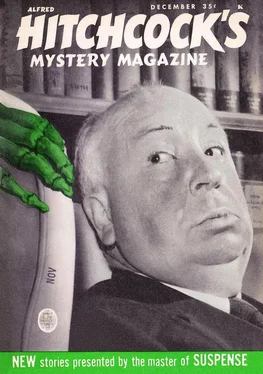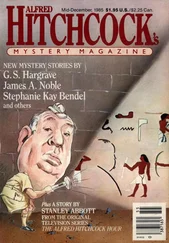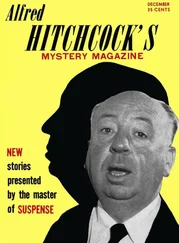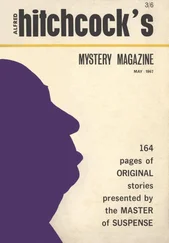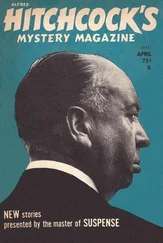Lisa Belknap - Alfred Hitchcock’s Mystery Magazine. Vol. 6, No. 12, December 1961
Здесь есть возможность читать онлайн «Lisa Belknap - Alfred Hitchcock’s Mystery Magazine. Vol. 6, No. 12, December 1961» весь текст электронной книги совершенно бесплатно (целиком полную версию без сокращений). В некоторых случаях можно слушать аудио, скачать через торрент в формате fb2 и присутствует краткое содержание. Город: Concord, Год выпуска: 1961, Издательство: H.S.D. Publications, Жанр: Детектив, на английском языке. Описание произведения, (предисловие) а так же отзывы посетителей доступны на портале библиотеки ЛибКат.
- Название:Alfred Hitchcock’s Mystery Magazine. Vol. 6, No. 12, December 1961
- Автор:
- Издательство:H.S.D. Publications
- Жанр:
- Год:1961
- Город:Concord
- ISBN:нет данных
- Рейтинг книги:3 / 5. Голосов: 1
-
Избранное:Добавить в избранное
- Отзывы:
-
Ваша оценка:
- 60
- 1
- 2
- 3
- 4
- 5
Alfred Hitchcock’s Mystery Magazine. Vol. 6, No. 12, December 1961: краткое содержание, описание и аннотация
Предлагаем к чтению аннотацию, описание, краткое содержание или предисловие (зависит от того, что написал сам автор книги «Alfred Hitchcock’s Mystery Magazine. Vol. 6, No. 12, December 1961»). Если вы не нашли необходимую информацию о книге — напишите в комментариях, мы постараемся отыскать её.
Alfred Hitchcock’s Mystery Magazine. Vol. 6, No. 12, December 1961 — читать онлайн бесплатно полную книгу (весь текст) целиком
Ниже представлен текст книги, разбитый по страницам. Система сохранения места последней прочитанной страницы, позволяет с удобством читать онлайн бесплатно книгу «Alfred Hitchcock’s Mystery Magazine. Vol. 6, No. 12, December 1961», без необходимости каждый раз заново искать на чём Вы остановились. Поставьте закладку, и сможете в любой момент перейти на страницу, на которой закончили чтение.
Интервал:
Закладка:
“You didn’t have my Daddy.”
“Oh, nuts.”
“You don’t know nothin’ about it,” Aggie said, beginning to look mad. “I was little and Daddy was big. No husband could seem that big to his wife. I was weak and Daddy was strong. No husband could seem that strong. Daddy loved me with a big strong love. A husband loves you, he wants something back. Daddy didn’t want anything back. Daddy fixed all my troubles. Plenty times, a husband just gives trouble. When I was with Daddy I was in the warmest safest place in the world. I wanted to give Daddy something and what did I have that was good but my singing? I gave it all to him and I got none of it left now for nobody else.”
Tony’s mouth opened and closed a few times. He said, “Well, O.K., O.K.” He went into the kitchen and opened a quart bottle of beer.
He didn’t say anymore about it afterwards. He just kept figuring how to break Aggie loose from her Block. Because he couldn’t let go. Because Aggie’s sweet singing was still in his head, faint and vague, and he wanted to hear it clear and real and just for him, and if he couldn’t he’d always feel an emptiness.
But you got to keep your mind on your work at Clancy’s Machine and Tool. Every machine is a killer if you let it get at you. One day, a machine got Tony.
It didn’t kill him, but for a long time all he knew was pain, and then he knew a little more, and then he woke up and he saw that he was in a private room in a hospital and that Aggie was sitting next to his bed. Tony knew that he couldn’t afford a private room. Once, a buddy of his started to die in a hospital and they put him in a private room even though he couldn’t pay for it and he died there without any extra charge. Tony figured this was the same deal.
“Aggie,” he said, “am I dying?”
“Of course not, you big ape,” Aggie said, her eyes red and teary.
Tony figured it looked bad, but he was so weak that he didn’t much care. He closed his eyes. He heard Aggie say, like from far away, “Tony, my darling, you want I should sing for you?”
Tony didn’t answer but he gave a little smile.
Aggie started to sing.
It was like a wave, lifting him up, soft and sweet and strong so that the pain and everything else slipped away. Tony knew that only one thing was beautiful and it was this, and though the sky might be beautiful with all the millions of stars twinkling from the furry black, it was only this; and that though Heaven might be beautiful, Heaven was this; and that though a cold glass of beer might be beautiful and the shape of a girl beautiful, they were this; and that though the straight true rush of a bowling ball to a strike, and the thudding hoofs of a champion horse might be beautiful, they were still this, because this was all beauty, all of it wrapped up. Tony wanted to die right then, so he could die happy.
But Tony didn’t die. He made it. A few weeks later, he was limping about the house, on the mend. The doctor said that soon he would be as good as new.
He was happy. Aggie had sung for him. She would again, he was sure. The Block was busted, Tony figured.
He needed her singing, now worse than ever because he’d had it for himself and the memory of it was teasing and demanding. He wanted to be hearing her sing forever, as long as they were both alive. Since his accident, it seemed somehow that her voice was firmer in his head, adhesive, like a silken band around his brain. It promised the beauty of reality. It softly veiled off other sound and thought, never completely leaving him.
When Aggie started singing to him, Tony thought, he wouldn’t need this memory anymore.
But Aggie didn’t sing.
At last, Tony asked her if she would.
“No,” she said.
“Whaddaya mean, no?”
“Like I said, no. I don’t sing for nobody.”
“But you sung for me.”
“That was different.”
“Because you thought I was dying?” Tony yelled. “Do I got to be dying to get a song out of you?”
“That wasn’t the reason I sung to you.”
“What was the reason?”
“Never mind.”
“Cut it out,” Tony yelled. “You sing, all right. You sung to me once. You sing when you’re alone. What’s it all about?”
“When I’m alone I sing to my Daddy.”
“That’s what I figured. Do you talk to him too?”
“Sure I talk to him.”
“Does he answer you back?”
“Sure he answers me back.”
“What does he say?”
“Never mind.”
“Never mind, never mind,” Tony said. “O.K., so how come you sang to me?”
“My Daddy told me to.”
“I see.”
“Yes. He told me, ‘I think the poor slob is going to kick the bucket, Aggie. Give the poor slob a song, Aggie.’ So I did.”
“I see.” Tony looked at her. “Why are you smiling?”
“I ain’t smiling.”
“Are you kidding me?”
“Would I kid you, dear?”
“Are you kidding me so I won’t bother you no more about singing? Or do you really believe your Daddy talks to you?”
“Forget it,” Aggie said.
“So you won’t sing for me?”
“Not unless my Daddy tells me to.”
“Who needs your stupid singing?” Tony yelled and walked away. He sat down in a chair and stared out the window. And her voice was in his head.
It was there, a sweet strong wave, holding all beauty, holding the sky and the stars and a cold glass of beer and the shape of a girl and the rush of a bowling ball and the thudding hoofs of a great-hearted horse and everything else that was beautiful. And it was not for him and never had been.
It was only for that stinking ghost of a Daddy.
And all he had was a teasing voice in his head.
A few days later, Tony killed his wife.
“It wasn’t just on account of she wouldn’t sing to me,” Tony told the police. “It was that she needed to be with her Daddy.”
The police couldn’t make much sense out of what Tony was telling them.
A Matter of Acoustics
by Georges Carousso
Walls have ears is an old saying, familiar long before the modern inventions of wired walls; or furniture, or tapped telephone wires; in fact, long before telephones were invented. It is true in this tale, otherwise modern in its circumstances and setting .
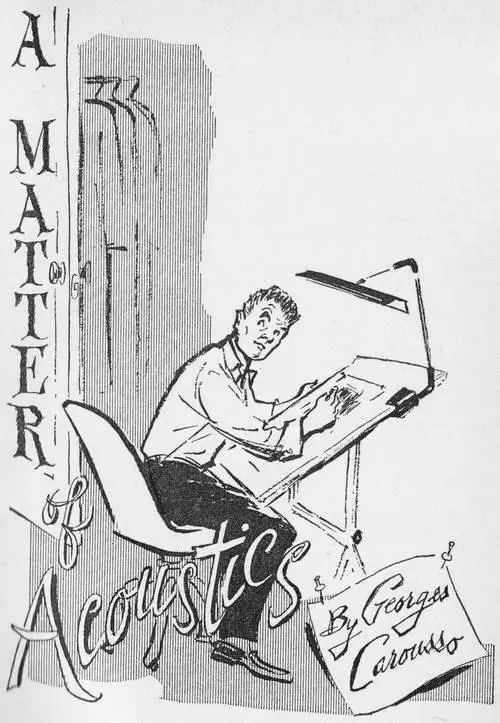
Those old saws people use about “Crime doesn’t pay”, “Murder will find you out”, and “There’s no such thing as a perfect crime”, have always handed me a laugh. I don’t have to sound cynical; it’s just that I’ve had too much proof to the contrary.
I’ve been an illustrator for a news syndicate for a long time and, because I have the perfectionist’s knack for details, one of my assignments has been to sketch courtroom scenes where photographers aren’t allowed. You don’t have to sit through too many cases before it becomes quite obvious that crime is a darn profitable business. About the only reasons why murders are solved are, because somebody squeals on the murderer, the murderer squeals on himself — psychiatrists call that “a subconscious desire for punishment” — or the murderer takes so many elaborate precautions to cover himself up, that he leaves a trail a mile wide.
The perfect crime has to be simple; no fancy murder methods, no complex alibis, no obvious motives. Like the murder of Sam Berringer. That was about as perfect as murder can ever be. The police still don’t realize how perfect it really was.
Somebody killed Sam by firing one shot into his heart from a .25 caliber automatic. That much the police could tell by examining the body and the small, but effective bullet. The rest was a complete blank. No fingerprints, no obvious motive, no suspect with an alibi.
Читать дальшеИнтервал:
Закладка:
Похожие книги на «Alfred Hitchcock’s Mystery Magazine. Vol. 6, No. 12, December 1961»
Представляем Вашему вниманию похожие книги на «Alfred Hitchcock’s Mystery Magazine. Vol. 6, No. 12, December 1961» списком для выбора. Мы отобрали схожую по названию и смыслу литературу в надежде предоставить читателям больше вариантов отыскать новые, интересные, ещё непрочитанные произведения.
Обсуждение, отзывы о книге «Alfred Hitchcock’s Mystery Magazine. Vol. 6, No. 12, December 1961» и просто собственные мнения читателей. Оставьте ваши комментарии, напишите, что Вы думаете о произведении, его смысле или главных героях. Укажите что конкретно понравилось, а что нет, и почему Вы так считаете.
